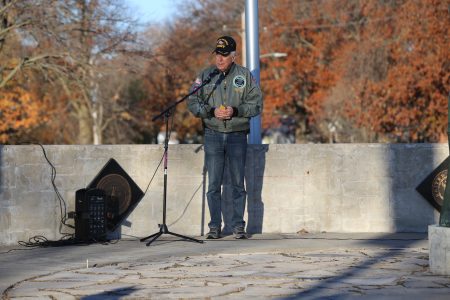Haskell president removed from office following investigation and concerns about free speech at university

photo by: Chad Lawhorn
Haskell Indian Nations University President Ronald Graham provides closing remarks at a Veterans Day celebration at the university on Wednesday, Nov. 11, 2020.
Updated at 4 p.m. Friday
The president of Haskell Indian Nations University has been removed from office following an internal investigation and criticism that he was stifling free speech rights of students and faculty.
Brandon Yellowbird-Stevens, president of the Haskell National Board of Regents, confirmed the removal of President Ronald Graham. Haskell’s student newspaper, The Indian Leader, also reported the dismissal.
“As the Board of Regents, we want to move forward and make sure there is a cohesive relationship between the Regents, the president of Haskell Indian Nations University and the Faculty Senate and staff,” Yellowbird-Stevens told the Journal-World. “This was a decision that more than likely needed to happen because of the, I’ll just say, disconnection between those bodies.”
Tamarah Pfeiffer, a leader in the federal government’s Bureau of Indian Education, will immediately assume the role of acting president of Haskell, according to an official email sent to members of the Haskell community.
Graham’s dismissal comes after he was the subject of a unanimous vote of no-confidence by Haskell’s Faculty Senate last month. In that 25-0 vote, the Faculty Senate said Graham had failed to call any Haskell Board of Regents meetings in his first year and to engage in shared governance.
Haskell is supposed to have at least one Board of Regents meeting each semester, according to the resolution. The Faculty Senate wrote that Graham’s failure to call a Board of Regents meeting threatened Haskell’s Higher Learning Commission accreditation. They also wrote that Graham had made no effort to engage in the shared governance structure, and instead delegated the task to the vice president for academics.
The resolution also stated that Graham had demonstrated disdain for the free speech rights of students and faculty. As the Journal-World has reported, in March the editor of Haskell’s student newspaper filed a federal lawsuit against Graham, the university, the BIE and BIE Director Tony Dearman. The lawsuit, filed by student editor Jared Nally, comes after Graham sent a directive to Nally in October that told the student journalist what he could and could not publish. Only a little over a week after he was sued by Nally, Graham sent a directive to his staff restricting how they could communicate. On April 6, Dearman rescinded Graham’s directive to his staff, stating that the bureau was committed to freedom of expression.
Following the vote of no-confidence, the Bureau of Indian Education sent a team to the Lawrence campus last month to do an administrative review.
Yellowbird-Stevens said the communication problems with Graham were significant.
“Those who have been at Haskell and who have graduated from Haskell understand it is a family,” Yellowbird-Stevens said. “When we can’t speak to each other like family and can’t communicate open and freely, that becomes an issue.
“Is it a family if you can’t do that? We typically want people to come in with that family aspect of everyone has a voice, and everyone can contribute. We try to steer away from a top-down methodology and environment.”
Yellowbird-Stevens said it was important for Haskell to have a strong process for selecting the university’s next president.
“What I would like to see more than anything is just a smooth transition,” he said.
Graham, a former division dean of instruction at Victor Valley College in Victorville, Calif., began his presidency of Haskell in May of 2020. Prior to his becoming president, Haskell was led by two interim presidents — Jim Rains and Dan Wildcat — for more than a year. Before that, Haskell was led by President Venida Chenault, who left in 2018 to work on special assignment for the Bureau of Indian Education just days after a federal report detailed allegations of misconduct at the university.
Yellowbird-Stevens said he hoped this change in leadership would spark discussions about changing Haskell’s structure. While Haskell has a Board of Regents, final decision-making often rests with the Bureau of Indian Education, which is just one piece of a large federal bureaucracy that includes the Bureau of Indian Affairs, under the U.S. Department of the Interior.
That structure has limited the pool of candidates that Haskell has been able to consider for the president’s position in the past, Yellowbird-Stevens said. He also said every Haskell president he’s aware of has expressed concerns about the structure of Haskell and how it functions too much like a bureaucracy rather than a traditional university.
“I want someone to come up with a solution so we can respond, react and perform like any other university that isn’t overseen by the federal government,” Yellowbird-Stevens said.
Yellowbird-Stevens said he was hopeful that a new structure could be considered for Haskell, given the change in federal administration, including new leadership within the Department of the Interior. He said there are structures in place at other institutions — he pointed to historically black colleges and service academies like West Point — that could be a model for Haskell.
“There are other institutions that are largely funded by the federal government and don’t still have the federal government strings attached,” he said.
As for the new acting president, Tamarah Pfeiffer is listed as the chief academic officer for the Bureau of Indian Education, according to the agency’s website. Her biography there says she has served 43 years as a teacher and administrator in the education world. She has a doctorate of education with a specialization in educational administration and American Indians from Penn State University. In her role with the Bureau of Indian Education, she has been based in Albuquerque, N.M.







